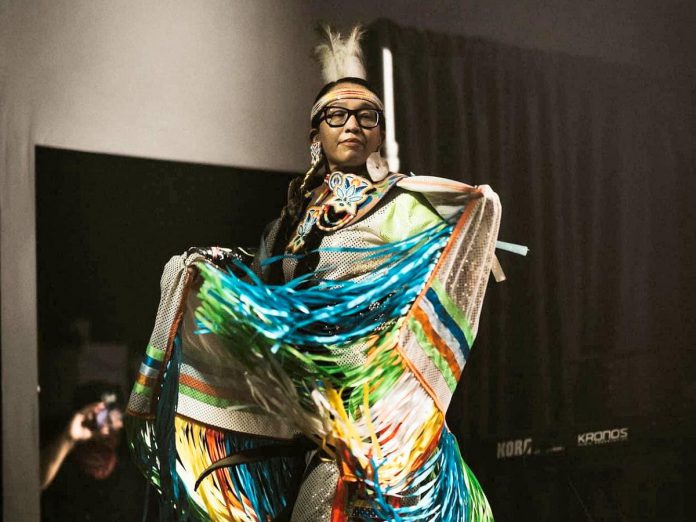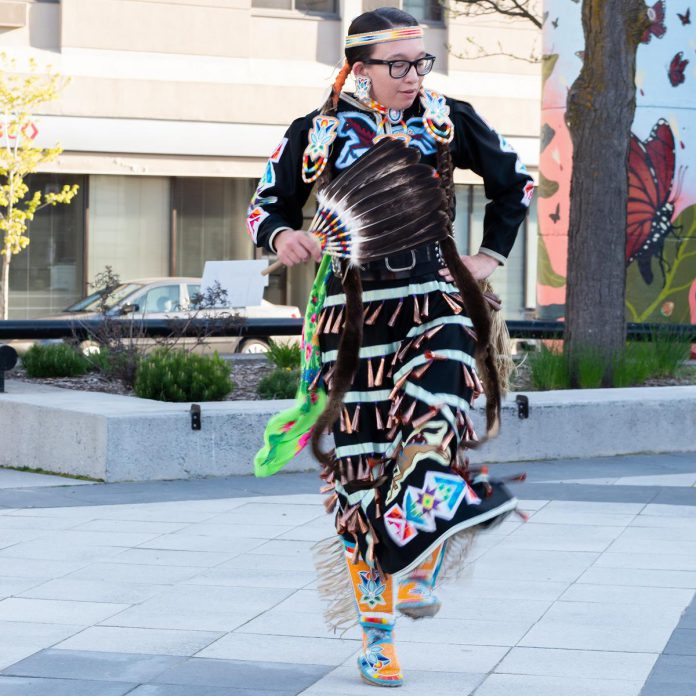
While Kelli Marshall has used dance to help her heal for as long as she can remember, only when she was an adult did she begin to learn the traditional dances of her Indigenous culture. Now, Marshall is helping other Indigenous people connect with their heritage.
Living in Peterborough/Nogojiwanong, Marshall is an Anishinaabe (Ojibway) from the Mississauga territory of Hiawatha First Nation representing the Pike Clan. While she is currently an Indigenous enrolment advisor at Trent University, for most of her life she was disconnected from her Anishinaabe heritage.
“I didn’t grow up in the culture,” Marshall explains. “I didn’t have the luxury of learning about it until I was much older. I knew all the stereotypes growing up for Indigenous people, but I didn’t know much about the good things because I was never taught them.”
Like so many Indigenous people, Marshall’s family was alienated from their culture and heritage because of The Indian Act, originally enacted by the Canadian government in 1876 with the aim of eradicating First Nations culture by assimilating Indigenous people into settler society. In 1884, the legislation was amended to provide for the creation of the residential school system, which continued to forcibly separate Indigenous children from their families until late in the 20th century.
Marshall says that, because of their histories and the Canadian government’s cruel treatment of them, her elders felt ashamed of where they came from and refused to talk about their heritage while she was growing up. Describing herself as being “racially ambiguous” as a child, Marshall didn’t understand why she was being treated differently than many of her peers, and why some friends were not allowed to hang out with her.
“When you’re that young, you know somebody doesn’t like you, but you don’t know why,” she explains. “You know it’s racism without knowing it’s racism when you’re young.”
VIDEO: Jingle Dress Dance performed by Kelli Marshall
Marshall grew up with a lot of frustration and anger, especially towards her grandfather, who, she explains, would throw down his status card without ever talking about being Indigenous.
“I was naive because I had no idea about the history,” she recalls. “They didn’t teach it in school, and they didn’t talk about it, so I didn’t know.”
Fortunately, dance was healing for her and she experimented in a range of styles, including jazz, hip hop, and ballet. But it wasn’t until she began to explore powwow dancing in her thirties — only a decade ago — that she began to feel a part of her culture.
“I was very lucky to start learning and the more I learned, the more I started filling that void that was in me,” she says, adding that one of the things she’s drawn to most with dance is the control of movements.
“As soon as I combined that [control] with powwow dancing or our traditional styles of dance, it was just almost this magic that happened. As soon as I started doing it, I felt home and connected, on top of that healing component that was always there for me.”
Exploring this side of her heritage allowed her to learn and understand some of the trauma that was inflicted on her relatives. She was first introduced to a healing dance called the jingle dress.

The regalia she wears has cones on it that rub together to sound like rain droplets when she’s dancing. According to Marshall, this represents water as the tool of cleansing. During the powwow, dancers offer semaa (tobacco) in exchange for asking anyone suffering mentally, physically, or spiritually to be healed.
“When we ask for something, we need to give something,” Marshall explains. “It’s about balance.”
During the powwow, the drummer sits in the middle while other dancers move clockwise. Everyone prays during the song and dance and raises their thoughts and prayers to the Creator by putting semaa in the sacred fire.
After beginning with the jingle dress dance, Marshall then learned the fancy shawl dance and women’s traditional dance. Now, sharing her dance in community settings helps her to continue to heal.
“When I’m dancing, I dance with every single part of who I am,” she says. “My relatives were denied these things or made to feel like they were wrong. So every time I put my regalia on and dance, I always think of my family that weren’t allowed to do it. I do it with pride and it’s absolutely just made my life so much better.”
Today, Marshall uses her knowledge and skills to share Indigenous teachings and help others to connect to their own cultures. As the Indigenous enrolment advisor for the First Peoples House of Learning at Trent University, she regularly visits communities across Ontario and Quebec and helps Indigenous learners get into post-secondary institutions.
VIDEO: “Resistance and Reclamation: Discovering Identity Through Powwow Dancing”
“Representation matters,” Marshall says. “It’s nice for students and learners to see people much like themselves with similar lived experience, and know that they can come to post-secondary and that they have a support network when they get here.”
The First Peoples House of Learning at Trent University supports the success of Indigenous learners by offering cultural services and activities.
“It’s the best of Western education, but also [Indigenous] traditional knowledge,” Marshall explains. “Culture is important for students to stay grounded and to help them be successful, because that’s part of who they are, and it’s nice that they can come here and learn and share their own culture.”
In addition to her role as an Indigenous enrolment advisor, Marshall also hosts weekly public powwow dancing classes throughout the school term at the university.
“I think it’s important to teach kids to dance because I know what it did for me. I know how it helped me, so I enjoy teaching others because I want them to be connected to the culture in the way that their ancestors once were.”
When she’s not teaching, Marshall continues to dance professionally. She travels to shows across North America with Juno award-winning DJ Shub, who does a signature “powwow step” style of music that combines electric dance with traditional tribal music. Marshall says she was “lucky and fortunate” enough to a part of his performance at the Juno Awards last year.
VIDEO: “Calling All Dancers” by DJ Shub featuring Kelli Marshall
“It’s amazing these artists are taking up spaces that normally were closed off to Indigenous people,” she says. “Kids need to see successful Indigenous musicians, successful indigenous doctors, everything.”
When she’s dancing, Marshall explains that it doesn’t matter how long the performance is or how heavy the regalia is, she always finishes a dance once she begins it.
“It doesn’t matter how tired you are. It’s that spirit. It doesn’t matter if your calves are burning or spazzing. We always finish that song, because we can.”



























